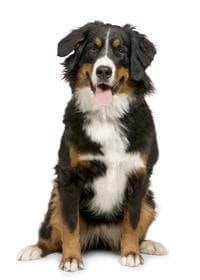Find products that match your dog’s needs

Anyone who's ever laid eyes on a Bernese Mountain Dog knows that there's something truly special about this breed. With their striking tri-coloured coat, gentle giant stature, and a warm, intelligent gaze, they capture hearts instantly. But before you fall head over heels for an adorable Berner puppy, it's important to fully comprehend what it means to share your life with one of these magnificent dogs.
Keep these factors in mind before you bring a Bernese Mountain Dog home:
Weight | 36 to 50 kg |
Height | 23 to 27 inches |
Lifespan | 6 to 8 years |
Coat | Double coat |
Note: The weight and height mentioned on the table is of a full-grown Bernese Mountain Dog and not of a Bernese Mountain puppy.
Like the Swiss Mountain dog, Bernese Mountain Dogs are renowned for their distinctive tri-coloured coat and beautiful markings. They possess a thick, silky double coat in a combination of colours:
Berners are classified as large dogs. Males generally stand between 25 to 27.5 inches at the shoulder and weigh a hefty 36 to 52 kgs. Females are slightly smaller, standing about 23 to 26 inches and weighing 31 to 43 kgs. Some other distinctive features are:
Beneath the stunning exterior of a Bernese Mountain Dog lies a heart full of affection and loyalty. These dogs crave human companionship and thrive on family interactions, be it a quiet nap or a lively game of fetch.
Despite their impressive size, they are known for their gentle nature, especially around children, demonstrating an impressive awareness of their own strength. Berners are generally easy-going, more likely to welcome you with a wagging tail than loud barking. They can be somewhat reserved around strangers, but a gentle introduction often results in a lifelong friend. Their intelligence is evident in their eagerness to learn new things and please their owners. Remember, while these qualities are typical of the breed, each Berner is unique and individual personality variations may occur.
Definitely! Even naturally well-behaved dogs like Bernese Mountain Dogs greatly benefit from training. Socialisation from an early age helps Berners confidently interact with the world around them, fostering positive interactions with other dogs and people. Training also reinforces good manners and strengthens the bond between the dog and owner.
As a breed, Berners respond remarkably well to positive reinforcement methods such as praise, treats, and play. Their intelligent nature necessitates mental stimulation as much as physical. Mental exercise, offered through puzzle toys, training sessions, and diverse experiences, keep these intelligent dogs engaged and content, contributing to their overall well-being.
Caring for a Bernese Mountain Dog is a fulfilling but significant responsibility. Here's a breakdown of these gentle giants' needs:
Sadly, compared to other dog breeds, Bernese Mountain Dogs have relatively short lifespans, typically ranging between 6-8 years. It's essential to be aware of the health issues they are prone to. These include hip and elbow dysplasia, which are joint problems caused by abnormal development. Berners can also be susceptible to certain types of cancer. Additionally, they are at an increased risk of bloat, a serious and life-threatening stomach condition. Regular veterinary checkups throughout your Bernese Mountain Dog's life are crucial for early detection and management of any health concerns.
Maintaining that iconic Bernese Mountain Dog coat requires dedication. Regular brushing, at least weekly, is key to preventing matting and keeping their fur looking its best. During those times when shedding is heaviest (usually spring and fall), daily brushing will help keep your home from looking like a snow flurry happened indoors. Baths every few months will keep your Berner clean and smelling fresh, but don't overdo it, as it can strip their skin of natural oils. Also, ensure regular nail trims to keep their paws healthy and comfortable, along with periodic ear and teeth cleaning for optimal hygiene.
Bernese Mountain Dogs enjoy a moderate level of activity. Daily walks, a good romp in a securely fenced yard, hikes, or even a swim will keep them both physically fit and mentally stimulated. Remember, their thick coats make them more sensitive to heat, so during warmer months, opt for early morning or evening exercise when the temperature is cooler. Puppies are full of beans but be mindful of their growing joints. Multiple short bursts of activity are better than long, strenuous sessions. As Berners are working dogs at heart, engaging them in activities like cart-pulling or agility can be both enriching and a fantastic way to expend energy.
Bernese Mountain Dogs thrive on a high-quality diet formulated specifically for their large breed size. It's essential to feed them age-appropriate dog food. A balanced puppy formula for young dogs, or an adult diet once they reach maturity. Consulting your veterinarian is always recommended for personalised dietary guidance. Be mindful of portion control to prevent obesity, which can seriously impact their joint health. As Berners are prone to bloat, using slow-feeding bowls or dividing their meals into smaller portions throughout the day helps them eat at a safer pace.
The Bernese Mountain Dog's journey begins in the Swiss Alps, where their ancestors likely arrived with the invading Roman legions over 2000 years ago. These powerful dogs effortlessly adapted to their mountain home, becoming indispensable farmworkers. They excelled at pulling carts loaded with dairy products, driving cattle to greener pastures, guarding property, and offering devoted friendship to their families. In the early 1900s, dedicated Swiss breeders recognised the breed's exceptional qualities and worked to preserve them, leading to the Bernese Mountain Dog we know and love today.
Bernese Mountain Dogs embody the phrase 'gentle giant' to the fullest. They exude warmth, kindness, and a goofy charm that's impossible to resist. Parenting a Berner is a gift that comes with great responsibility and requires commitment. But the rewards? Immeasurable.
Yes, Bernese Mountain Dogs typically get along well with other pets, especially if socialised early. Their gentle nature makes them adaptable companions.
Absolutely! Bernese Mountain Dogs are known for their affectionate, patient, and playful personalities, making them wonderful family companions.
Bernese Mountain Dogs can be left alone for short periods, but they thrive on companionship and may experience separation anxiety if isolated.
Bernese Mountain Dogs have thick double coats requiring regular brushing to prevent mats. They shed moderately, with heavier shedding seasonally.
Bernese Mountain Dogs are not excessive barkers. They may bark to alert or greet, but generally have calm temperaments.

Find a PEDIGREE® stockist
near you!
Buy online
Click to buy from any of the retailers below

